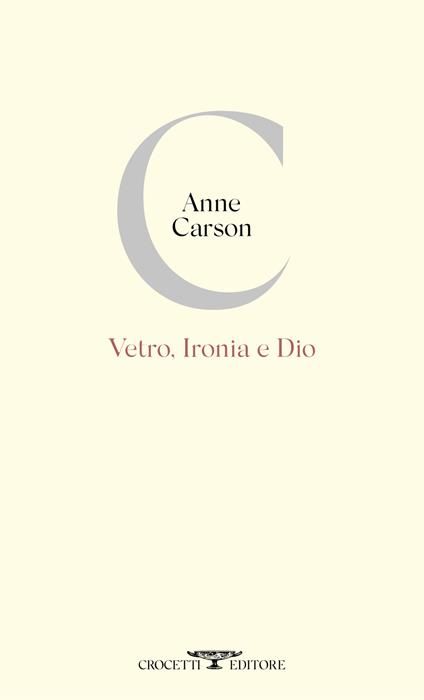
Anne Carson, Vetro, ironia e Dio
Pubblichiamo, per gentile concessione dell’editore e del curatore, tre poesie dal nuovo libro di Anne Carson, Vetro, Ironia e Dio (a cura di Patrizio Ceccagnoli, Crocetti, Milano 2023).
La cucina
La cucina al mio arrivo è calma come un osso.
Nessun suono dal resto della casa.
Aspetto un attimo
poi apro il frigo.
Lucente come un’astronave emana una fredda confusione.
Mia madre vive sola e mangia poco ma il suo frigo è
[sempre stipato.
Dopo aver estratto un vasetto di yogurt
da sotto un’astuta composizione di blocchi di dolce di
[Natale avanzato
avvolti in stagnola e flaconi di medicinali soggetti a
[prescrizione medica
richiudo la porta del frigo. Un crepuscolo bluastro
riempie la stanza come un mare che rifluisca.
Mi appoggio al lavandino.
I cibi bianchi per me sono i migliori
e preferisco mangiare da sola. Non so perché.
Una volta ho sentito delle ragazze cantare una canzone per
[il Primo Maggio che diceva:
Violante in dispensa
rosicchia un osso di montone
Come l’ha rosicchiato
Come l’ha artigliato
Quando si credette sola.
Le ragazze sono le più crudeli con sé stesse.
Qualcuna come Emily Brontë,
che rimase una ragazza per tutta la vita nonostante il corpo
[da donna,
aveva crudeltà accumulata in tutte le crepe del corpo come
[neve primaverile.
In varie occasioni possiamo vederla liberarsene
col gesto col quale spazzolava il tappeto.
Parlaci e poi frustalo!
fu il consiglio dato (a sei anni) a suo padre
riguardo al fratello Branwell.
E quando a 14 anni fu morsa da un cane rabbioso, si
[diresse a gran passi (così dicono)
in cucina e prendendo delle pinze roventi dalla stufa le
[applicò
direttamente al proprio braccio.
La cauterizzazione di Heathcliff durò più a lungo.
Più di trent’anni nel tempo del romanzo,
da quella sera d’aprile quando corse fuori dalla porta della
[cucina
e svanì nella brughiera
perché aveva sentito una frase a metà di Catherine
(“Mi degraderebbe sposare Heathcliff”)
fino al mattino selvaggio
in cui il servo lo trovò morto e sorridente
sul letto bagnato dalla pioggia al piano superiore di Cime
[Tempestose.
Heathcliff è un demone del dolore.
Se fosse rimasto in cucina
abbastanza a lungo per ascoltare l’altra metà della frase di
[Catherine
(“così non saprà mai quanto lo amo”)
Heathcliff sarebbe stato liberato.
Ma Emily sapeva come catturare un demone.
Al posto di un’anima infuse in lui
il costante, freddo distacco di Catherine dal suo sistema
[nervoso
ogni volta che prendeva fiato o formava un pensiero.
Troncò a metà tutti i suoi momenti,
lasciando aperta la porta della cucina.
Non mi manca familiarità con questa vita a metà.
Ma c’è dell’altro.
La disperazione sessuale di Heathcliff
non sorse da alcuna esperienza analoga nella vita di Emily
[Brontë,
per quanto ne sappiamo. La domanda,
riguardante gli anni di crudeltà interiore necessari a
[trasformare una persona in un demone del dolore,
le venne in una cucina dolcemente illuminata dal fuoco
(“kichin” nella grafia di Emily) dove lei
e Charlotte e Anne sbucciavano le patate insieme
e inventavano storie con il vecchio cane ai loro piedi,
[Keeper.
Esiste un frammento
di una poesia che scrisse nel 1839
(circa sei anni prima di Cime tempestose) che dice:
Quell’uomo di ferro è nato come me
E fu una volta un ragazzo ardente:
Nell’infanzia dovette sentire
Tutta la gloria di un cielo d’estate.
Chi è quest’uomo di ferro?
La voce di mia madre mi attraversa,
dalla stanza accanto dov’è sdraiata sul divano.
Sei tu cara?
Sì Ma’.
Perché non accendi la luce?
Oltre la finestra della cucina guardo il sole d’acciaio
[d’aprile
sferrare le sue ultime strisce gialle
attraverso uno sporco cielo d’argento.
Ok Ma’. Che c’è per cena?
(Da Il saggio di vetro)
Kitchen
Kitchen is quiet as a bone when I come in.
No sound from the rest of the house.
I wait a moment
then open the fridge.
Brilliant as a spaceship it exhales cold confusion.
My mother lives alone and eats little but her fridge
[is always crammed.
After extracting the yogurt container
from beneath a wily arrangement of leftover blocks
[of Christmas cake
wrapped in foil and prescription medicine bottles
I close the fridge door. Bluish dusk
fills the room like a sea slid back.
I lean against the sink.
White foods taste best to me
and I prefer to eat alone. I don’t know why.
Once I heard girls singing a May Day song that went:
Violante in the pantry
Gnawing at a mutton bone
How she gnawed it
How she clawed it
When she felt herself alone.
Girls are cruelest to themselves.
Someone like Emily Brontë,
who remained a girl all her life despite her body as a
[woman,
had cruelty drifted up in all the cracks of her like
[spring snow.
We can see her ridding herself of it at various times
with a gesture like she used to brush the carpet.
Reason with him and then whip him!
was her instruction (age six) to her father
regarding brother Branwell.
And when she was 14 and bitten by a rabid dog she
[strode (they say)
into the kitchen and taking red hot tongs from the
[back of the stove applied
them directly to her arm.
Cauterization of Heathcliff took longer.
More than thirty years in the time of the novel,
from the April evening when he runs out the back
[door of the kitchen
and vanishes over the moor
because he overheard half a sentence of Catherine’s
(“It would degrade me to marry Heathcliff”)
until the wild morning
when the servant finds him stark dead and grinning
on his rainsoaked bed upstairs in Wuthering Heights.
Heathcliff is a pain devil.
If he had stayed in the kitchen
long enough to hear the other half of Catherine’s
[sentence
(“so he will never know how I love him”)
Heathcliff would have been set free.
But Emily knew how to catch a devil.
She put into him in place of a soul
the constant cold departure of Catherine from his
[nervous system
every time he drew a breath or moved thought.
She broke all his moments in half,
with the kitchen door standing open.
I am not unfamiliar with this half-life.
But there is more to it than that.
Heathcliff’s sexual despair
arose out of no such experience in the life of Emily
[Brontë,
so far as we know. Her question,
which concerns the years of inner cruelty that can
[twist a person into a pain devil,
came to her in a kindly firelit kitchen
(“kichin” in Emily’s spelling) where she
and Charlotte and Anne peeled potatoes together
and made up stories with the old house dog Keeper at
[their feet.
There is a fragment
of a poem she wrote in 1839
(about six years before Wuthering Heights) that says:
That iron man was born like me
And he was once an ardent boy:
He must have felt in infancy
The glory of a summer sky.
Who is the iron man?
My mother’s voice cuts across me,
from the next room where she is lying on the sofa.
Is that you dear?
Yes Ma.
Why don’t you turn on a light in there?
Out the kitchen window I watch the steely April sun
jab its last cold yellow streaks
across a dirty silver sky.
Okay Ma. What’s for supper?
Teresa di Dio
“il dolore mi possiede O demone doloroso”
Teresa viveva in un suo personale cubo nero.
L’ho vista colpire il muro ovunque si muovesse.
Malediceva il suo cuore
che era, a suo dire, lacerato
e il suo naso
che era stato più volte fratturato.
Alcuni devono combattere in ogni momento della loro vita
che Dio ha foderato con un animale in fiamme –
perché penso
Dio voglia che quell’animale sia tenuto in vita.
Con il suo naso Teresa metteva in discussione
questo progetto divino.
Al suo cuore Dio mandò una risposta.
Dopo la sua morte l’autopsia rivelò
che era davvero lacerato.
Si dovettero falsificare
fotografie dell’evento (con del filo rosso e un vecchio
guanto dorato)
mentre le lenti continuavano a sciogliersi.
(Da La verità su Dio)
Teresa Of God
“the aching has hold of me O grievous daimon”
Teresa lived in a personal black cube.
I saw her hit the wall each way she moved.
She cursed her heart
which was, she said, rent
and her nose
which had been broken again and again.
Some people have to fight every moment of their
[lives
which God has lined with a burning animal –
I think because
God wants that animal kept alive.
With her nose Teresa questioned
this project of God’s.
To her heart God sent answer.
The autopsy after her death revealed
it was indeed rent.
Photographs of the event
had to be faked (with red thread and an old gold
[glove)
when the lens kept melting.
Uomini della TV: Ettore
II
Ettore nacque per essere un principe troiano, non un uomo
[della TV,
da qui il suo successo.
Le persone sbagliate funzionano alla TV, sono così
[ovviamente
un’anima scissa
e tutti ne amiamo il pathos.
Seguiamo Ettore
alla vigilia delle riprese nella Valle della Morte.
Ettore riposa
nella sua armatura sul letto del motel osservando sé stesso
[e le sue rosse labbra
in alto sopra la testa.
Il soffitto è riflesso nel fuoco divino.
La tua Legge ha preso possesso
delle mie viscere, mormora. Il suo rossetto gli sorride
sottosopra.
Fuori dalla finestra può vedere un orizzonte di basse
[montagne
che vanno brune da un capo all’altro.
Emettono un sibilo. Oh principe troiano!
Burro e miele
tu possa mangiare, che tu sappia rigettare il male
e scegliere il bene.
La TV è intrinsecamente cinica. Parla all’occhio di chi
guarda, ma la mente non ha occhi.
(Da Uomini della TV)
TV Men: Hektor
II
Hektor was born to be a prince of Troy not a man of
[TV,
hence his success.
Wrong people look good on TV, they are so obviously
a soul divided
and we all enjoy the pathos of that.
Let us join Hektor
on the eve of the Death Valley shoot.
Hektor lies
on the motel bed in his armour observing himself and
[his red lips
high overhead.
The ceiling is mirrored in divine fire.
Your Law has got hold
of my entrails, he murmurs. His lipstick grins at him
upside down.
Out the window he can see a horizon of low brown
[mountains
laid end to end.
They make a hissing sound. O prince of Troy!
Butter and honey
shall you eat, that you may know to refuse the evil
and choose the good.
TV is inherently cynical. It speaks to the eye, but the
[mind has no eye.
Articoli correlati
No related posts.
-
L’interpretazione e noi
-
 Nuovi doveri per il mondo in trasformazione
Nuovi doveri per il mondo in trasformazione -
 Tentativi di palingenesi. Ricominciare. Classici della letteratura italiana 1939-1962 di Riccardo Gasperina Geroni
Tentativi di palingenesi. Ricominciare. Classici della letteratura italiana 1939-1962 di Riccardo Gasperina Geroni -
 Dario Bellezza, un incontro. A trent’anni dalla morte rinasce un libro fondamentale (con testi inediti)
Dario Bellezza, un incontro. A trent’anni dalla morte rinasce un libro fondamentale (con testi inediti) -
 Orbit orbit o «gloria all’immaginazione». Note di ascolto dell’album di Caparezza
Orbit orbit o «gloria all’immaginazione». Note di ascolto dell’album di Caparezza -
-
La scrittura e noi
-
 Inchiesta sulla letteratura Working class / 9 – Simona Baldanzi
Inchiesta sulla letteratura Working class / 9 – Simona Baldanzi -
 Proposte per giovani lettori – Genesis, di Bernard Beckett
Proposte per giovani lettori – Genesis, di Bernard Beckett -
 Inchiesta sulla letteratura Working class / 8 – Sonia Maria Luce Possentini
Inchiesta sulla letteratura Working class / 8 – Sonia Maria Luce Possentini -
 Perché leggere Apeirogon di Colum McCann
Perché leggere Apeirogon di Colum McCann -
-
La scuola e noi
-
 “Hic Rhodus, hic salta”: i cambiamenti dell’Esame di maturità alla prova del reale
“Hic Rhodus, hic salta”: i cambiamenti dell’Esame di maturità alla prova del reale -
 «Il carcere è farsi passare la voglia di sushi coi cracker». Dialogo con Tazio Brusasco sulla scuola in carcere
«Il carcere è farsi passare la voglia di sushi coi cracker». Dialogo con Tazio Brusasco sulla scuola in carcere -
 Contro la scuola neoliberale
Contro la scuola neoliberale -
 ”La risposta è 42”. La professione docente nella scuola italiana tra norma e prassi
”La risposta è 42”. La professione docente nella scuola italiana tra norma e prassi -
-
Il presente e noi
-
 “Ultimo schiaffo”. La dark comedy della marginalità
“Ultimo schiaffo”. La dark comedy della marginalità -
 In memoria di Mario Palumbo
In memoria di Mario Palumbo -
 L’America di Renée Nicole Good: paura, coraggio e resistenza al nuovo fascismo
L’America di Renée Nicole Good: paura, coraggio e resistenza al nuovo fascismo -
 “Nella mia fine è il mio principio”: i commissariamenti nazionali della scuola e il caso toscano
“Nella mia fine è il mio principio”: i commissariamenti nazionali della scuola e il caso toscano -
Commenti recenti
- Matteo Zenoni su “Hic Rhodus, hic salta”: i cambiamenti dell’Esame di maturità alla prova del realeHo letto con attenzione l’articolo della collega Innocenti, che stimo e ammiro per la sua…
- Margherita Ganeri su In memoria di Mario PalumboConservo un ricordo molto bello di Mario Palumbo, un uomo di rara sensibilità e spessore…
- Jugendliteratur brisant #39: Pia Valentinis, Ferriera – Sempre giovane è la conoscenza su Inchiesta sulla letteratura Working class / 6 – Pia Valentinis[…] dedicata al tema “Working class”, è stata pubblicata una sua intervista relativa a Ferriera:…
- Ednave Stifano su Lettera agli insegnantiNon so se sia uno dei motivi del degrado culturale italiano ma si tratta, comunque,…
- Matteo Zenoni su «Il carcere è farsi passare la voglia di sushi coi cracker». Dialogo con Tazio Brusasco sulla scuola in carcereGrazie per questo dialogo a due voci, da cui estraggo queste parole: « È di…
Colophon
Direttore
Romano Luperini
Redazione
Antonella Amato, Emanuela Bandini, Alberto Bertino, Linda Cavadini, Gabriele Cingolani, Roberto Contu, Giulia Falistocco, Orsetta Innocenti, Daniele Lo Vetere, Morena Marsilio, Luisa Mirone, Stefano Rossetti, Katia Trombetta, Emanuele Zinato
Caporedattore
Roberto Contu
Editore
G.B. Palumbo Editore


Lascia un commento